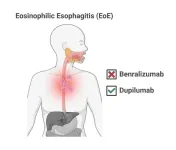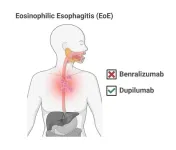(Press-News.org) Despite high hopes, a drug that wipes out the namesake cell type associated with the disease eosinophilic esophagitis (EoE) doesn’t make patients feel better and doesn’t reverse tissue damage in their throats.
Meanwhile, data show that a different drug that had previously been approved for use in adults and teens with EoE is also safe and effective for children under 12 who weigh at least 15 kg (about 33 pounds).
The results of these clinical trials—plus an accompanying editorial—appear in the June 17, 2024, edition of The New England Journal of Medicine.
“Together, these trials provide exciting advances in our understanding of, and treatment options for, this increasingly common and perplexing disease,” writes Benjamin Wright, MD, an allergist-immunologist with The Mayo Clinic in Phoenix, AZ.
Long-time EoE expert Marc Rothenberg, MD, PhD, and colleagues at Cincinnati Children’s were deeply involved in both studies.
What is EoE?
This severe form of food allergy occurs in an estimated 180,000 people in the United States, including at least 21,000 children under 11. For those affected, a variety of foods can trigger a powerful immune response. Patients can experience painful throat inflammation, tissue damage, and difficulty swallowing. When not controlled, the ongoing disruption to a healthy diet can limit a child’s growth and lead to other complications.
The most distinguishing feature of EoE has been a well-documented spike in the number of eosinophils – a type of white blood cell – found in the throat. For many years this surge of immune cells also was believed to be the primary cause of the disease.
New findings from the Phase 3 MESSINA clinical trial add to a body of evidence suggesting otherwise.
Effective but not helpful
This study evaluated a monoclonal antibody treatment called benralizumab, which has been shown in other studies to be highly effective at reducing unwanted eosinophils. Somewhat like an exploding paint capsule making it easier for cops to catch a bank robber, the antibody binds to eosinophil cells and exposes them to patrolling natural killer cells.
In fact, this treatment has been approved for treating poorly controlled asthma because it helps break a feedback cycle of eosinophil-mediated hyperreaction and mucus production in inflamed airways. That asthma success inspired many scientists to hope that benralizumab would become a difference-maker in treating EoE.
But when tested in 211 patients with EoE—ages 12 to 65—people still experienced inflammation, difficulty swallowing, pain, and reduced quality of life. This occurred despite more than 80% of those taking benralizumab showing “near-complete depletion” of eosinophils in their blood and esophagus. Further, microscopic exams of tissue samples showed no significant improvement at a biological level.
“This trial calls into question the clinical relevance of monitoring EoE for treatment effect solely on the basis of the degree of eosinophilic inflammation,” says Rothenberg. "The MESSINA study highlights the importance of research as it was a very reasonable assumption that eosinophilic esophagitis would be caused by eosinophils. Based on these new results, we now know that this assumption is primarily incorrect."
Rothenberg, who directs the Division of Allergy and Immunology at Cincinnati Children's, served as corresponding author for the study. Evan Dellon, MD, MPH, with the University of North Carolina at Chapel Hill, was co-first author.
Extended approval for dupilumab
Benralizumab targets the activity of interleukin-5 (one of several proteins involved in our bodies’ immune response). But other research has shown better results against EoE by targeting two other interleukins at the same time: IL-4 and IL-13.
The US Food and Drug Administration initially approved the drug dupilumab for treating EoE in 2022, but only for adults and teens. Based on data from a more recent clinical trial focusing on younger children, the FDA acted in January 2024 to extend approval to children aged 1 to 12 who weigh at least 15 kg (about 33 pounds).
The data and related findings that supported that decision also were published in NEJM on June 27.
To date, dupilumab is the only FDA-approved medication that precisely treats EoE in children.
Years of research producing results
Rothenberg and Margaret Collins, MD, Division of Pathology and Laboratory Medicine at Cincinnati Children’s, were co-authors on both studies published in the NEJM. They have been studying EoE for decades and have been active since the early days in evaluating both drugs.
Julie Caldwell, PhD, Division of Allergy and Immunology at Cincinnati Children’s, was a co-author on the benralizumab study.
What’s next for doctors, researchers and people with EoE?
In the short term, Rothenberg says that patients should consider dupilumab, but not benralizumab, or continue (or return to) other treatments that have been helpful. Dietary elimination therapy to avoid offending food triggers has been used for years but can be tough to follow. Various medications have helped some patients manage symptoms, including proton-pump inhibitors and steroid treatments. A few newer approaches are still being studied in other clinical trials.
Longer term, Rothenberg and other scientists are looking farther “upstream” from eosinophils in the body’s natural cascade of immune system responses to find other ways to stop, slow, or prevent the damage caused by EoE.
Until such work produces new options, Rothenberg also recommends that clinicians rely less upon eosinophil levels as the sole feature to gauge the severity of EoE. Other tests such as endoscope exams and collecting tissue samples for microscope analysis appear more likely to provide meaningful information.
“We need a more relevant biomarker to measure clinical response in eosinophilic esophagitis,” Rothenberg says. “That is certainly one of our main research goals as we move forward.”
About these studies
The MESSINA clinical trial was supported by AstraZenica. The dupilumab clinical trial was supported by Sanofi and Regeneron Pharmaceuticals.
END
Two studies show mixed progress against EoE
Experts at Cincinnati Children’s play key roles in one trial that supports dupilumab use for children under 12 and another study showing no relief for people taking benralizumab. Both studies appear in The New England Journal of Medicine.
2024-06-27
ELSE PRESS RELEASES FROM THIS DATE:
Why the harsh Snowball Earth kick-started our earliest multicellular ancestors: new study
2024-06-27
For a billion years, single-celled eukaryotes ruled the planet. Then around 700 million years ago during Snowball Earth — a geologic era when glaciers may have stretched as far as the Equator — a new creature burst into existence: the multicellular organism.
Why did multicellularity arise? Solving that mystery may help pinpoint life on other planets and explain the vast diversity and complexity seen on Earth today, from sea sponges to redwoods to human society.
Common wisdom holds that oxygen levels had to hit a certain threshold ...
Bin Wang receives Friedrich Wilhelm Bessel Research Award
2024-06-27
NORMAN, OKLA. – Bin Wang, a professor in the School of Sustainable Chemical, Biological and Materials Engineering at the University of Oklahoma, has received a Friedrich Wilhelm Bessel Research Award from the Alexander von Humboldt Foundation. Wang was selected for his contributions to computational catalysis and physical chemistry.
The Bessel Award is funded by the German Federal Ministry of Education and Research to foster collaborative relationships between international academics and German researchers. The award ...
Decline in UK coronary heart disease rates offset by rise in other cardiovascular conditions
2024-06-27
Rates of coronary heart disease in the UK have declined by about 30% over the past two decades, but this has been offset by rising rates of other conditions affecting the heart or blood vessels, finds a study in The BMJ today.
What’s more, improvements in rates of coronary heart disease almost exclusively appeared to benefit the over 60s, with little or no improvement in younger or more deprived groups, the results show.
As such, the researchers say future prevention strategies might need to consider a broader spectrum ...
Specialist weight-loss services in England unable to keep up with spiralling demand
2024-06-27
One in six integrated care boards (ICBs) in England have stopped accepting new patients for specialist weight management services as their referral numbers spiral out of control, an investigation by The BMJ has found.
ICBs are responsible for planning health services for their local population. At least seven out of 42 ICBs across the country - covering Manchester, Bristol, Suffolk, Leicester, Essex, and much of Yorkshire - have had to close a specialist (tier 3) weight management service list in their area, with many warning that demand is far exceeding capacity, reports Elisabeth Mahase.
Experts have said the rise in obesity and the demand for weight-loss injections may be fuelling ...
Cardiovascular health could be biggest risk factor for future dementia rates
2024-06-27
Dementia risk factors associated with cardiovascular health may have increased over time compared to factors such as smoking and having less education, finds a new study led by UCL researchers.
The study, published in The Lancet Public Health, explored how the prevalence of dementia risk factors had changed over time and how this could impact rates of dementia in the future.
It is estimated that there are currently 944,000 people living with dementia in the UK and 52% of the UK public – 34.5 million ...
New study shows alcohol rehabilitation and abstinence reduce the risk of alcohol-associated cancers
2024-06-27
June 26, 2024 (Toronto, Canada) – A new study conducted by the Centre for Addiction and Mental Health (CAMH), Bordeaux University Hospital, France, and the World Health Organization (WHO) has found that individuals with alcohol dependence who undergo rehabilitation or maintain abstinence experience significantly lower risks of developing alcohol-associated cancers. The article, entitled Alcohol rehabilitation and cancer risk: a nationwide hospital cohort study in France was published today in Lancet Public Health. It is the largest of its kind to provide evidence linking reduced ...
Early childhood problems linked to persistent school absenteeism
2024-06-27
University of Leeds news
Children who are not considered “school ready” by their teachers are more than twice as likely to become persistently absent at some point in their education, according to a new study led by the University of Leeds.
Researchers analysed data for 62,598 children aged 5-13 from across the Bradford district and compared it with school absence records between the academic years 2012/2013 and 2019/2020 to identify associations between early childhood problems and absenteeism.
The team from the School of Psychology and the Born in Bradford Centre for Applied Education Research found ...
Use of glucose monitors by people not living with diabetes needs more regulation
2024-06-27
A new narrative review1 led by researchers at UCL and Birmingham Children’s Hospital has found there is a lack of evidence to demonstrate the effective use of continuous glucose monitors (CGMs) in people not living with diabetes (PNLD).
In the study, published in Diabetic Medicine, researchers conclude there is currently little published evidence on how accurate CGMs are in measuring blood glucose levels in PNLD, nor sufficient evidence of what the health benefits or utility ...
Two studies shows mixed progress against EoE
2024-06-27
Despite high hopes, a drug that wipes out the namesake cell type associated with the disease eosinophilic esophagitis (EoE) doesn’t make patients feel better and doesn’t reverse tissue damage in their throats.
Meanwhile, data show that a different drug that had previously been approved for use in adults and teens with EoE is also safe and effective for children under 12 who weigh at least 15 kg (about 33 pounds).
The results of these clinical trials—plus an accompanying editorial—appear in the June 17, 2024, edition of The New England Journal of Medicine.
“Together, these trials provide exciting advances in our understanding of, and treatment options for, ...
Specific bacteria in your gut are involved in compulsive eating and obesity
2024-06-27
Vienna, Austria: An international team of researchers has identified specific bacteria in the gut that are associated with both mice and humans developing an addiction to food that can lead to obesity. They have also identified bacteria that play a beneficial role in preventing food addiction.
The research is presented today (Thursday) at the Federation of European Neuroscience Societies (FENS) Forum 2024 and is published simultaneously in the journal Gut [1,2].
Professor Elena Martín-García, from the Laboratory of Neuropharmacology-NeuroPhar in the Department of Medicine and Life Sciences at the Universitat ...
LAST 30 PRESS RELEASES:
Study reveals insights about brain regions linked to OCD, informing potential treatments
Does ocean saltiness influence El Niño?
2026 Young Investigators: ONR celebrates new talent tackling warfighter challenges
Genetics help explain who gets the ‘telltale tingle’ from music, art and literature
Many Americans misunderstand medical aid in dying laws
Researchers publish landmark infectious disease study in ‘Science’
New NSF award supports innovative role-playing game approach to strengthening research security in academia
Kumar named to ACMA Emerging Leaders Program for 2026
AI language models could transform aquatic environmental risk assessment
New isotope tools reveal hidden pathways reshaping the global nitrogen cycle
Study reveals how antibiotic structure controls removal from water using biochar
Why chronic pain lasts longer in women: Immune cells offer clues
Toxic exposure creates epigenetic disease risk over 20 generations
More time spent on social media linked to steroid use intentions among boys and men
New study suggests a “kick it while it’s down” approach to cancer treatment could improve cure rates
Milken Institute, Ann Theodore Foundation launch new grant to support clinical trial for potential sarcoidosis treatment
New strategies boost effectiveness of CAR-NK therapy against cancer
Study: Adolescent cannabis use linked to doubling risk of psychotic and bipolar disorders
Invisible harms: drug-related deaths spike after hurricanes and tropical storms
Adolescent cannabis use and risk of psychotic, bipolar, depressive, and anxiety disorders
Anxiety, depression, and care barriers in adults with intellectual and developmental disabilities
Study: Anxiety, gloom often accompany intellectual deficits
Massage Therapy Foundation awards $300,000 research grant to the University of Denver
Gastrointestinal toxicity linked to targeted cancer therapies in the United States
Countdown to the Bial Award in Biomedicine 2025
Blood marker from dementia research could help track aging across the animal world
Birds change altitude to survive epic journeys across deserts and seas
Here's why you need a backup for the map on your phone
ACS Central Science | Researchers from Insilico Medicine and Lilly publish foundational vision for fully autonomous “Prompt-to-Drug” pharmaceutical R&D
Increasing the number of coronary interventions in patients with acute myocardial infarction does not appear to reduce death rates
[Press-News.org] Two studies show mixed progress against EoEExperts at Cincinnati Children’s play key roles in one trial that supports dupilumab use for children under 12 and another study showing no relief for people taking benralizumab. Both studies appear in The New England Journal of Medicine.



